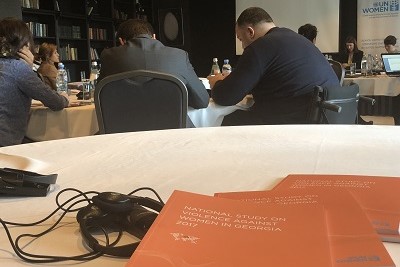Taking stock before initiating sexual harassment amendments
Date:
The Gender Equality Council of the Parliament, with support from UN Women and the USAID-funded East-West Management Institute’s PROLoG, organized a meeting for the MPs, staffers and colleagues of the Ministry of Internal Affairs (MIA) and the Public Defender’s Office (PDO).

The goal of the meeting was to discuss the proposed package of legislative amendments aiming to combat sexual harassment. The meeting was hosted and facilitated by MP Dimitri Tskitishvili of the Gender Equality Council. The management team of the MIA’s Human Rights Protection Department, the Deputy Public Defender and the head of the PDO’s Gender Equality Department provided inputs about the status quo in terms of the types of sexual harassment complaints that have been received, as well as the limitations of the current legal framework to provide remedies or investigative powers in instances of sexual harassment.
Attendees discussed examples of harassment in public places and shortcomings of the existing legislation to respond to them. In this light, the novelty of the package of legislative amendments developed by the Gender Equality Council with the support of PROLoG is that, along with improved regulation against workplace sexual harassment, it addresses instances of sexual harassment in public spaces through administrative fines. The package of legislative amendments speaks directly to the findings of the National Study on Violence against Women conducted by GEOSTAT with EU/UN Women technical and financial support in 2017. The Study found that one in five women (20 per cent) have experienced at least one form of sexual harassment, 70 per cent of whom encountered it in public places. It was agreed that these as well as other findings of the Study will inform the advocacy and lobbying process in support of the proposed amendments.
International expert on the topic Sarah McCoubrey, brought in by UN Women, introduced the global context around sexual harassment derived from research as well as international obligations and relevant definitions. More importantly, the meeting participants discussed key approaches and strategies towards positive social change challenging the normalization of the practice of sexual harassment, including but not limited to media engagement, academic research, economic analysis and the deconstruction of myths. The preventive value of the proposed amendments was underscored by many of the meeting participants.
It is anticipated that the amendments will be initiated in the Parliament by the Gender Equality Council in November 2018.